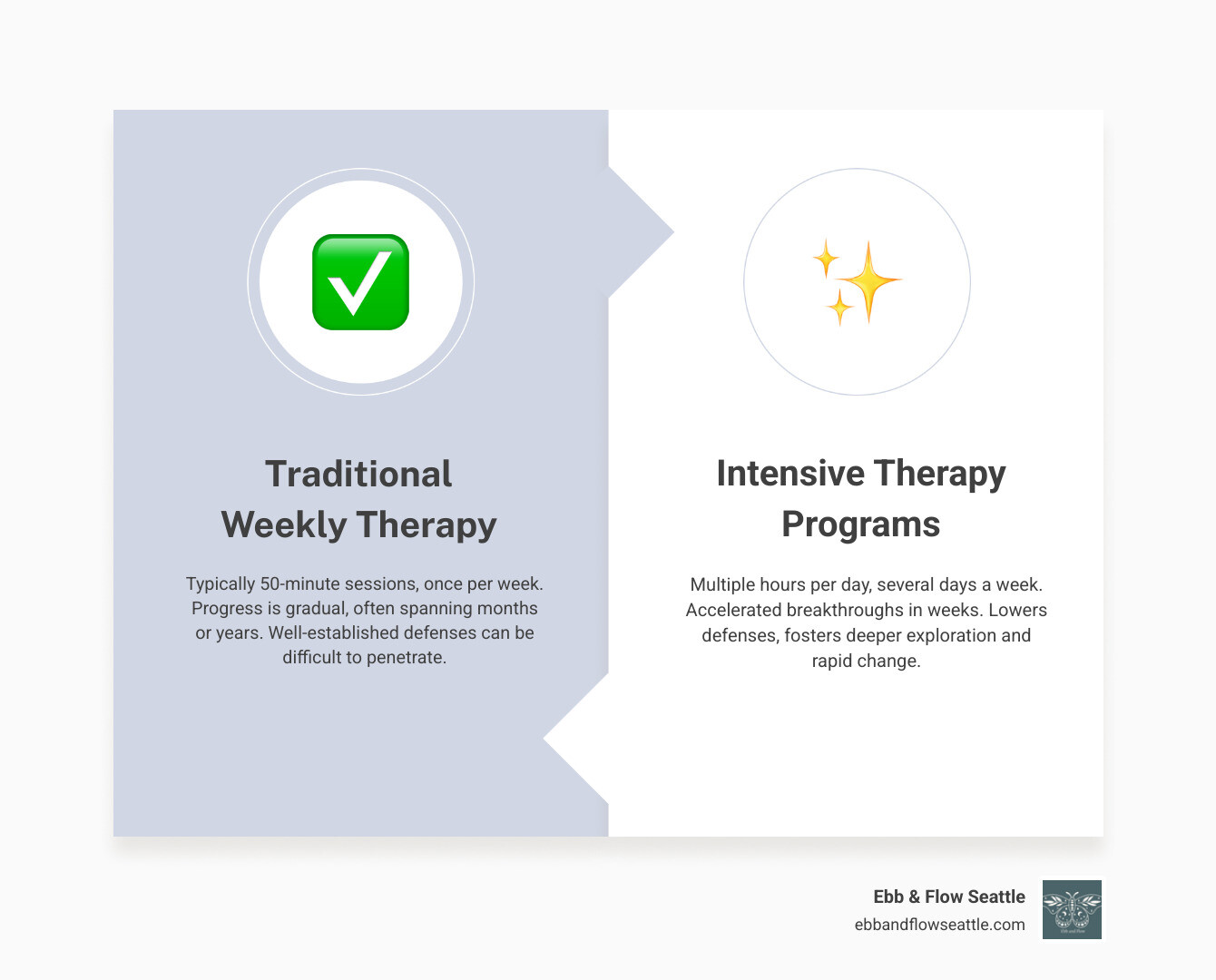Intensive Therapy Programs: When You're Ready to Stop Playing Small and Start Healing Deep

You know that feeling when you're constantly moving, constantly doing, but somehow never actually being? When the quiet moments feel unbearable because they whisper truths you're not ready to hear? I see you. I work with women just like you—brilliant, sensitive souls who learned early on that being the "good girl" was the safest way through this harsh world. You've been over-functioning ever since, haven't you?
Maybe you've tried traditional therapy before. Maybe you're sitting there thinking, "I've done the work," but deep down, you know something's still not right. You're still choosing the wrong partners, still numbing out with food or wine or endless Netflix, still running yourself ragged because busy feels safer than still. These patterns, these behaviors that once helped you cope, now keep you stuck.
Here's what I know to be true: sometimes once-weekly therapy isn't enough. Sometimes you need to go deeper, move faster, and build the momentum that finally breaks years of stuck patterns. That's where intensive therapy programs come in - and why we've made them a cornerstone at Ebb & Flow Seattle, serving clients in Lynnwood and Seattle.
What Makes Intensive Treatment Different (And Why It Works)
Let me be straight with you—intensive therapy isn't just regular therapy sessions crammed into longer blocks. It's a completely different approach to mental health treatment. Think of traditional therapy like taking vitamins—helpful, steady, but sometimes slow to show results. Intensive therapy? That's like getting an IV drip of pure healing. It's concentrated, focused, and designed to create breakthroughs in days or weeks rather than months or years.
In my intensive programs, we're talking multiple hours of deep therapeutic work per week over a condensed timeframe. No more spending the first 20 minutes of each session catching up on the week. No more feeling like you take two steps forward only to slide three steps back between appointments. We build momentum that compounds on itself, creating what I call a "healing container"—a sacred space where your defenses can finally, truly relax.
The research on intensive outpatient treatment backs this up. Studies show that intensive formats can lead to significant improvements in mental health symptoms—including anxiety, depression, and trauma symptoms—in remarkably short timeframes. But honestly? The real magic happens in the lived experience. I've watched women transform before my eyes, finally accessing parts of themselves they'd buried decades ago.

The Structure That Creates Transformation in Mental Health Treatment
Here's where I get to call bullshit on the one-size-fits-all approach to behavioral healthcare. Every intensive treatment program I create is as unique as the woman sitting across from me. Some clients need three hours a day for a week. Others do better with full-day sessions spread across a month. The structured approach bends to fit your life, not the other way around.
My comprehensive treatment approach weaves together several powerful modalities:
Brainspotting cuts through the talking and goes straight to where trauma lives in your body and brain. By working with specific points in your visual field, we can access and release stored experiences that traditional talk therapy alone might never touch. In an intensive format, this work goes deep—really deep. We're not just scratching the surface; we're excavating and healing at the root.
Acceptance and Commitment Therapy (ACT) helps you stop the exhausting battle with your own thoughts and feelings. Instead of pushing away the hard mental health symptoms (which, let's be honest, never actually works), you learn to make space for all of it while still moving toward what matters to you. In an intensive program, we don't just talk about these concepts—we practice them, embody them, integrate them into your bones. These become real coping skills you can use in daily life.
Person-Centered Therapy means I'm not sitting there with a clipboard, nodding and saying "mm-hmm" while secretly checking the clock. As your primary therapist, I'm fully present, fully engaged, bringing my whole self to every moment of our work together. This isn't performative empathy—it's real, raw, authentic connection that creates genuine support.
The beauty of working this way? We can include body-based and experiential approaches that help you reconnect with your own wisdom. Your body knows things your mind hasn't figured out yet. Movement, breathwork, somatic experiencing—these aren't woo-woo add-ons. They're legitimate, powerful behavioral health services for accessing healing that lives beyond words.
Who This Intensive Outpatient Work Is Really For
Let me paint you a picture of my ideal client, and see if she sounds familiar:
She's sensitive—maybe even told she's "too sensitive" her whole life. She learned early that the world wasn't built for her particular brand of feeling everything so deeply. So she adapted. She became the good girl, the achiever, the one who could handle anything. She over-functions like it's an Olympic sport.
She stays busy because stillness feels dangerous. In those quiet moments, uncomfortable truths bubble up: the relationship that's slowly killing her soul, the way she uses food or substances to cope, the risky behaviors that give her a momentary hit of feeling alive. She knows things need to change, but the knowing feels overwhelming, so she shoves it down and schedules another meeting, takes on another project, says yes to another thing she doesn't want to do.
She's tired of living at the surface. She's ready to stop abandoning herself for everyone else's comfort. She wants to reclaim that wild, authentic part of herself that she buried so long ago she's not even sure it still exists (spoiler: it does).
If you're nodding along, feeling seen in a way that's both comforting and terrifying, intensive therapy might be exactly what you need. This format works particularly well for treating various mental health conditions:
- Anxiety disorders that feel like a constant companion, that busy brain that never shuts off
- Binge eating patterns that feel out of control, where food has become your primary way to cope
- The aftermath of narcissistic abuse, when you're trying to rebuild your sense of self after someone systematically dismantled it
- Substance use issues that started as fun but somewhere along the way became the only way you know how to manage symptoms

The Real Benefits of Intensive Outpatient Programs (Not the Bullshit Ones)
I'm not going to promise you that an intensive treatment plan will fix everything. That's not how healing works, and anyone who tells you otherwise is selling something. But here's what I can tell you is possible with the appropriate level of care:
You'll move faster than you thought possible. When we work intensively, we bypass a lot of the resistance that builds up between weekly therapy sessions. Your nervous system stays engaged in the healing process, creating momentum that builds exponentially. Breakthroughs that might take months in traditional outpatient treatment can happen in days.
You'll go deeper than surface-level coping strategies. We're not just slapping Band-Aids on gaping wounds here. We're getting to the root of why you keep choosing partners who don't see you, why you can't stop the binge-restrict cycle, why anxiety has become your default setting. Through individual therapy within the intensive structure, we're rewiring patterns that have been running your life from the shadows.
You'll actually integrate what you learn. This isn't intellectual understanding—it's embodied knowing. Through repeated practice in our intensive container, new ways of being become second nature. You don't just learn about boundaries; you practice setting them. You don't just understand nervous system regulation; you experience it in your body. These become real skills for daily life.
You'll reconnect with your own wisdom. Somewhere along the way, you learned not to trust yourself. Maybe you were gaslit, maybe your feelings were minimized, maybe you were told you were too much or not enough. Intensive work helps you remember that you've always known what you need. My job is just to help provide the support you need to hear it again.
You'll build genuine self-efficacy. This isn't fake empowerment or toxic positivity. This is the bone-deep knowing that you can handle whatever comes your way—not because you're bulletproof, but because you've learned to be with yourself through anything. This benefit extends far beyond our therapy sessions.

Group Therapy: Finding Your People in the Healing Journey
While I primarily offer individual intensive work, I also run several group therapy programs that can complement or follow your intensive experience. There's something powerful about healing in community, about looking across the room and seeing someone else who gets it—really gets it.
My Women's Group Therapy creates a sacred space where you can drop the mask and be real about what you're going through. My Binge Eating Group brings together women who understand the particular hell of feeling out of control around food. And my 12-Week Health Group takes a holistic approach to reclaiming your relationship with your body and wellbeing.
Group therapy isn't about comparing war stories or wallowing in shared misery. It's about witnessing each other's transformation, offering support when someone's struggling, and celebrating the wins—both big and small. It's about realizing you're not as alone or as broken as you thought.
Making the Decision: Is This Your Time for Intensive Treatment?
Choosing an intensive outpatient program is a big fucking deal. It requires courage, commitment, and a willingness to feel things you've been avoiding for years. So how do you know if you're ready for this level of mental health treatment?
Ask yourself:
- Are you tired of the same patterns and behaviors playing out over and over?
- Do you have a sense that there's something deeper that needs attention, something weekly therapy hasn't quite reached?
- Are you ready to stop talking about change and actually embody it?
- Can you create the time and space (multiple hours per week) to prioritize your healing?
- Are you willing to be uncomfortable in service of your growth?
- Do you need more support than traditional therapy provides but want to maintain your daily life?
If you're feeling that mixture of "hell yes" and "oh shit," you might be ready for this approach to treating your mental health issues.
The Practical Stuff: Your Personalized Treatment Plan
Once you decide to move forward, we create a personalized treatment plan that works for your life. This isn't something you squeeze in between meetings. You need to create space—physical, emotional, and energetic space—for this work.
During our initial consultation, we'll develop a care plan that considers:
- Your specific mental health conditions and symptoms
- Your schedule and availability for sessions per week
- Whether online or in-person sessions work better for you
- What combination of individual and group work might serve you best
- How to structure the intensive for maximum impact
Clear your schedule as much as possible. Let people know you're doing something important for yourself (you don't owe them details). Stock your fridge with nourishing food. Create a support plan for after sessions—maybe that's a friend on standby, a journal ready, or a bath drawn.
During the intensive treatment program itself, expect intensity (shocking, I know). You'll have breakthrough moments that feel like coming home to yourself. You'll also have moments where every cell in your body wants to run. Both are normal. Both are part of the recovery process.

Virtual or In-Person: Flexible Outpatient Programs
I offer both online and in-person intensive outpatient care because healing shouldn't be limited by geography. My Lynnwood office provides a sacred physical space for those who want to be held in person. But I've also witnessed profound transformation through screens—the intimacy and safety of being in your own space can actually deepen the work for some.
Virtual intensive programs aren't a consolation prize or a watered-down version. They're a legitimate, powerful way to engage in this transformative behavioral health treatment. Technology has made it possible to create genuine connection and deep healing regardless of physical distance. Whether you choose virtual or in-person, you'll receive the same comprehensive treatment approach.
Supporting Your Loved Ones Through Their Journey
Sometimes you're not the one seeking treatment—you're watching a loved one struggle. If someone you care about is considering intensive therapy, your support can make a real difference. You don't need to understand everything they're going through to be there for them.
Ways to support a loved one in treatment:
- Respect their need for space and time to focus on healing
- Avoid asking for details about their therapy sessions unless they offer
- Help with practical matters so they can focus on their recovery
- Remember that their healing journey isn't about you
- Celebrate their courage in seeking help
The Integration: Making Your Treatment Plan Stick
Here's something nobody talks about enough: the real work often happens after the intensive. You've just cracked yourself open, excavated old wounds, and planted new seeds. Now you need to tend to them. This is where your ongoing care plan becomes crucial.
Integration looks different for everyone. Maybe it's continuing with maintenance therapy sessions. Maybe it's joining one of my group programs to stay connected to your growth in community. Maybe it's taking what you've learned and running with it solo for a while.
What matters is that you have a structured plan. We'll create that together before our intensive ends, ensuring you're not left hanging when our concentrated work is complete. This might include strategies for:
- Maintaining the coping skills you've developed
- Recognizing when symptoms might be returning
- Building prevention practices into your daily life
- Knowing when to reach back out for additional support
For the Therapists Reading This
I also offer Intensives for Therapists because I believe healers need deep healing too. If you're a therapist feeling stuck in your own growth or wanting to experience intensive work firsthand before offering it to clients, I've got you. This work has transformed my practice and my life, and I'm passionate about sharing it with other healers ready to go deeper.
Understanding Different Levels of Mental Health Services
It's important to understand that intensive outpatient programs exist on a spectrum of behavioral healthcare services. While I don't offer every type of treatment, understanding the full continuum can help you make informed decisions about the appropriate level of care for your needs.
The mental health treatment spectrum includes various outpatient programs, from traditional weekly therapy to more intensive formats. What I offer sits in that sweet spot—more support than traditional therapy, but designed to let you maintain your daily life and responsibilities. It's structured enough to create real change, flexible enough to work with your real life.
The Bottom Line: Your Mental Health Recovery Can't Wait
I get it. Part of you is probably thinking, "Maybe I should wait until..." Stop right there. There's never a perfect time. There's never a moment when life slows down enough, when you feel ready enough.
But here's what I know: you're drowning in "fine." You're suffocating under the weight of being good enough. And some part of you—that wild, authentic, beautifully messy part—is screaming to be let out.
Intensive therapy programs aren't about fixing you because you're not broken. They're about remembering who you were before the world told you who to be. They're about reclaiming your voice, your power, your right to take up space. They're about finally, finally coming home to yourself.
The combination of intensive individual work, group support when needed, and a personalized approach to treating your specific struggles creates a powerful container for transformation. Whether you're dealing with anxiety, depression, substance use, binge eating, or the aftermath of narcissistic abuse, there's a path forward that honors your unique story.
If something in this speaks to that quiet voice inside you—the one you usually ignore or push down—maybe it's time to listen. I'm here when you're ready to dive deep, to do the real work, to stop playing small and start living as the magnificently complex woman you are.
Ready to explore if an intensive outpatient program is right for you? Let's talk. Reach out to schedule a consultation where we can discuss your specific needs and create a treatment plan that works for you. No bullshit, no judgment, just two humans figuring out if this is the right next step for your healing journey.
